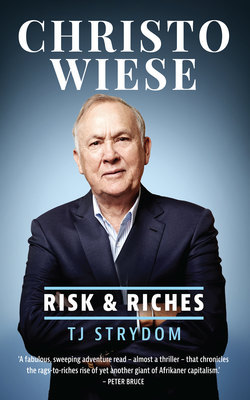Читать книгу Christo Wiese - TJ Strydom - Страница 4
На сайте Литреса книга снята с продажи.
1.
ОглавлениеBaggage
‘If a man were to write such a book, a biography, he should tell the truth. And if I tell the whole truth, I’ll embarrass a whole lot of people, including myself.’
Christo Wiese in an initial discussion about this book, 2018
The Slumdog Millionaire theme song bursts over the radio at regular intervals. ‘Jai Ho! … Catch me, catch me, catch me, c’mon catch me,’ sing Nicole Scherzinger and the Pussycat Dolls on a crisp London morning. The tune has been on Britain’s top ten chart for three weeks.
The mercury won’t climb higher than 11 degrees Celsius today. It’s overcast and it looks like rain.
Christo Wiese is on his way to the airport. It takes less than an hour to get from the Ritz Hotel to the terminal. London City Airport is a favourite among business travellers. It’s much closer to the City than Heathrow or Gatwick and has an expedited procedure at the check-in counter.
Wiese wants to catch an early flight to Luxembourg, returning the same day. It’s a Monday in April and at the weekend he attended a wedding in Russia. His flight to Moscow was booked so as to give him the chance of casting his vote in Cape Town in South Africa’s general elections before departing.
‘I have no reason to believe that Jacob Zuma would do a worse job than anyone else,’ the Sunday newspaper Rapport quoted him as saying.1 Whether his vote was one of the 11,6 million cast that gave Zuma and the ANC a comfortable majority in the 2009 election is his secret. Other business leaders are worried about the new man on his way to the Union Buildings, but Wiese is ever the optimist. ‘What possible advantage is there in being negative? I know our country has problems. All countries do, and you are surely better equipped to handle the challenges and problems where you live and know the territory.’
Today, he is entering uncharted territory.
A customs official searches Wiese’s hand luggage and finds it stuffed full of banknotes. It’s a stash of £120 000 (at the time worth more than R1,5 million) in used £50 and £20 notes. The official questions him about the bonanza.2
It’s from a safety deposit box at the Ritz Hotel, he explains, but until the end of last year it was in a strong box with UBS, a bank, here in London. On the form the official hands him to fill in, he notes that he is carrying the money to keep in safe storage. Wiese also provides a contact number for the relevant person at UBS and gives the details of his accountants.
A while later the officials go through Wiese’s checked-in baggage and discover more notes, some in a poor state, bundled together and bound with elastic bands. They estimate the find at between £400 000 and £500 000. The actual amount is £554 920 (another R7 million).
Now why didn’t he declare this money on the form he had just filled in?
No, he thought they were only asking about the money in his hand luggage.
Wiese explains to the officials that he is a regular visitor to the United Kingdom. He tells them that his company Pepkor has four thousand stores that sell a variety of goods. The money they see here in his suitcases is from South Africa and is the proceeds of diamond deals in the 1980s and 1990s. The money was taken out of his home country in the form of travellers’ cheques and had been cashed abroad and then stored. Owing to South Africa’s foreign exchange controls at the time, the money was taken either to Britain or Switzerland. And now he is on his way to Luxembourg to invest the money there or open an account.
Then why keep the money in a strong box all this time and not in a bank?
He didn’t want to leave an audit trail, as previously in South Africa one was not allowed to keep money offshore. By keeping it in strong boxes there would be no paper trail, he tells the officials.
Wiese is polite and gives his cooperation throughout the questioning. He can go. But his money stays behind in the United Kingdom. The authorities apply to have it forfeited to the state.3 To them this stash of notes looks as if it was laundered.
